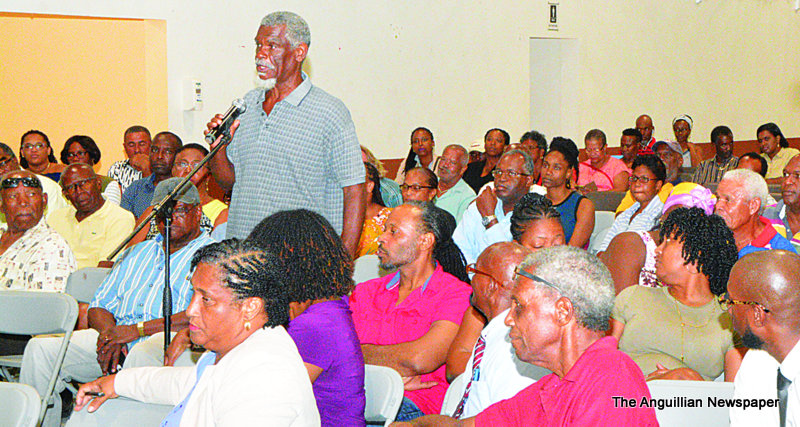The longstanding debt, owed to the Government of Anguilla, by individuals and companies, was the subject of much concern at the State of the Nation town hall meeting, on September 16, at the Rodney MacArthur Rey Auditorium.
The meeting was held by the Anguilla Progressive Movement Government, now in office for almost three months. The event included reports on the island’s financial situation delivered by Accountant General, Mr. Vonlee Harris; Principal Assistant Secretary, Finance, Ms. Marisa Harding-Hodge; and the Comptroller of Inland Revenue, Mr. Kiel Connor, who gave explanations during the question and answer period.
One of the main public commentators, during that period, was Mr. Conrad (Cutter) Gumbs, a well-known patriotic activist, with a passion for good governance, community wellbeing and partnership.
The financial reports showed that members of the public had owed the former and present Government of Anguilla millions of dollars for public services, including hospital fees, and taxes for eight years and more – and that little was being done to recoup the outstanding debt. The figures showed that, the Comptroller of Inland Revenue had, on his own initiative, gone out into the private sector and succeeded in collecting several millions owed to the Government. As a result of his intervention, the debt had been reduced to some fifty-six million dollars – still a very high amount. He was commended for his efforts by Premier Dr. Ellis Webster who has responsibility for Finance.
On the other hand, Mr. Gumbs, joined by other commentators, argued that it was a matter of carelessness that the Inland Revenue Department, and the Government, had allowed the public debt to have accumulated to millions of dollars in unpaid bills. The comments also came in the wake of the Anguilla Government being told in the recent UK Government’s financial MOU that the outstanding sums, owed by persons and companies in Anguilla, should be collected from them or they should be taken to court.

One of Mr. Gumbs’ arguments was that there were cases on the island where certain companies and individuals were in a position to pay their debts to Government, but were deliberately failing to do. On the other hand, poorer citizens and businesses, referred to as the “small man” were struggling, willing, and being pressured to pay their dues.
Mr. Gumbs later told The Anguillian newspaper: “This matter can be properly addressed. I think the Department of Inland Revenue should meet with these people personally. If they cannot afford to pay this money one time, they should do so in installments instead of owing the Government year after year with the debt continuing to go up and up. If the debt was paid in installments, the Government would be collecting money and not be so much in the red.”
He continued: “As I said before, at the town hall meeting, the National Bank of Anguilla failed because the small loans that were serviced could not keep up the bank’s expenses, while the people, with the bigger loans, and in a better financial position, were not paying. Thus, the bank collapsed. If the Government does not get down on these people, who owe them vast amounts of money, some owing millions of dollars, the same thing will happen to this country. One day, the Government will be refused gas at the gas station. They will call for the air ambulance to fly out somebody, and the Government will be refused because they do not have any money.”
He continued: “Fifty-six million dollars is a great lot of money for thirteen thousand people (the population of Anguilla) to owe. That does not include hospital debts and I am not too sure about the debts to the Water Corporation and I feel that people should make an effort to pay these taxes and fees owed to the Government. There are those who genuinely do not have any money. May be they have tentative jobs with low salaries and so on; but there are those who can afford to pay. Some in the business sector may be struggling but that does not mean that they cannot pay some of the money.
“I do not believe in increasing taxes with so many million dollars are on the street. If the Government can collect fifty percent of that money, there would not be a need to put more taxes on the people…”
Mr. Gumbs, a respected retired Superintendent of Prisons in Anguilla, and now President of the Farmers’ Association, added: “We need to put tight legislation in place to collect Government’s money even if it means taking persons to court. If, after the court order, they do not pay, then you proceed to take their property because they cannot go on not paying the Government when the Government got financial responsibilities to the nation.”
Premier Webster agreed that Government’s agencies needed to collect monies owed to the Treasury, but indicated a reluctance for court proceedings. He favoured the approach of the Comptroller of Inland Revenue who went out and got persons to pay their bills.








